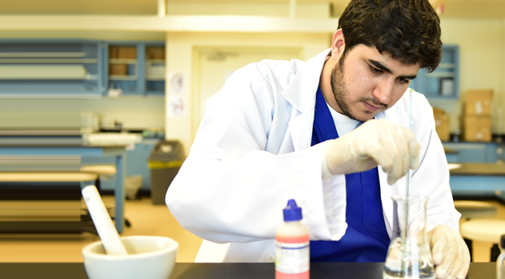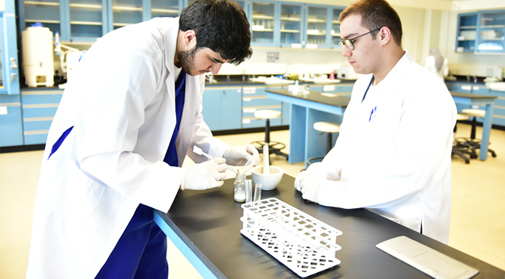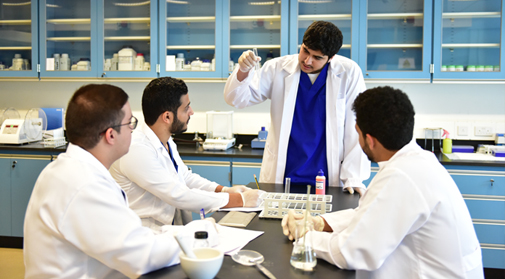Pharm.D. (Doctor of Pharmacy)
The curriculum of the Doctor of Pharmacy (Pharm.D.) Program at Alfaisal University is designed to systemically provide a solid foundation in the basic sciences on which to build upon, and integrate the pharmaceutical sciences, social/administrative/behavioral sciences, and clinical sciences. Consistent with the College of Medicine at Alfaisal University, the Pharm.D. curriculum uses the "SPICES" curriculum model as a guiding philosophy with these elements: Student-centered/active learning, Problem/practice based, Integrated, Community/systems-based, Electives, and Systematic approaches. In addition, the curriculum incorporates research and interprofessional experiences.
The integrated pharmacotherapy course sequences with case-based seminars that employ case-based collaborative learning (CBCL) approach; a hybrid of problem-based learning (PBL), and team-based learning (TBL) approaches. These courses will be offered in the early professional phase of the Pharm.D.curriculum to promote learning in both small groups to prepare for "case-based seminars" and in a tutorial settings with student-directed learning.
Distinguishing features of the program include state-of-the art practicum and simulation experiences, a pharmacy practicum training laboratory with inpatient ambulatory care, and community pharmacy components will be offered is a set of patient care and health system management laboratory courses. Introductory Pharmacy Practice Experience (IPPE) courses in a community settings, as well as in an inpatient and outpatient settings will expose the students to the various pharmacy practice opportunities. Students will learn the fundamental research principles and apply research skills by conducting a research project as a capstone experience prior to the Advanced Pharmacy Practice Experiences (APPE) phase. The last phase of the Pharm.D. program will consist of state of the art APPE rotations in-patient (hospital/health system) and out-patient (community/ambulatory care) settings that expose students to diverse patient populations as part of an interprofessional team.
Program objectives
The Doctor of Pharmacy (Pharm.D.) program at Alfaisal University prepares clinical pharmacists to provide comprehensive medication management using a patient-centered approach within interprofessional health care teams. The entire program requires a total of six years; the first year as the University Preparatory Program (UPP), followed by 4 years of didactic, practicum/simulation and introductory practice experiences, and a final year of advanced clinical/experiential education. Graduates of the program will be qualified practitioners with unique training in the appropriate use of medications and expertise in the provision of patient care services in a variety of different practice settings. The integration of research within the Pharm.D. program provides an optimal environment that promotes critical thinking, analytical and lifelong learning, and prepares graduates for application of research.At the conclusion of the Pharm.D. Program, all graduates will achieve the following outcomes:
- Demonstrate a scientific foundation as related to the clinical, pharmaceutical, and social/administrative/behavioral sciences.
- Identify and evaluate research methods and demonstrate research skills relevant to the pharmacy profession that can be applied in different practice settings.
- Integrate systems management concepts in the pharmacy profession, including the management of drug formulary systems (i.e., hospital, healthcare system, or national-based).
- Practice evidence-based decision making and implement pharmaceutical care plans.
- Provide comprehensive medication management to optimize medication use and health outcomes, reduce adverse drug events and improve patient safety.
- Promote and implement public health, wellness and disease prevention concepts.
- Demonstrate effective oral and written communication skills to peers, other professionals, patients and the public.
- Demonstrate a commitment to continuous professional and leadership development.
Program structure
The entire program requires a total of six years, divided as follows;
Year |
Courses |
Credit hours |
First year |
University Preparatory Program- Medical and Pharmacy track |
23 |
Second –fifth year |
Didactic courses |
135 |
Sixth year |
Advanced clinical/experiential education, via |
40 |
Total |
198 |
|
Pharm D Program Learning Outline
An essential part of the educational process, learning outcomes are carefully planned learning processes at College of Pharmacy Alfaisal University. Program Learning Outcomes (PLOs) within our college, follow the educational outcomes outlined by Education and Training Evaluation Commission (ETEC)–Saudi Arabia. Accordingly, this has been mapped and aligned across the Pharm D curriculum and to all Course Learning Outcomes (CLOs). Hence, the PLO of the Pharm D graduate is aimed to fulfil the following attributes:
1. A Safe Practitioner Ensure patient safety by consistently applying best practices, adhering to ethical standards, and maintaining a vigilant approach to managing risks in all healthcare settings.
2. A Collaborator Actively participate and engage as a healthcare team member by demonstrating mutual respect, understanding, and values to meet patient care needs.
3. A Communicator Effectively communicate verbally and nonverbally when interacting with an individual, group, or organization.
4. An Advocate Assure that patients’ best interests are represented.
5. A Leader Demonstrate responsibility for creating and achieving shared goals, regardless of position.
6. A Professional Exhibit behaviors and values that are consistent with the trust given to the profession by patients, other healthcare providers, and society.
7. A Lifelong Learner Develop, integrate, and apply knowledge from the foundational sciences (i.e., pharmaceutical, social/behavioral/administrative, and clinical sciences) to evaluate the scientific literature, explain drug action, solve therapeutic problems, and advance population health and patient centered care.
The primary goal is to establish Specialized Learning Outcomes (SLOs) that outline the minimum requirements pharmacy students must meet before graduation, including Essential Knowledge Units (EKUs) for foundational non-pharmacy knowledge and General Knowledge Units (GKUs) for core pharmacy topics. The tables below detail the EKUs and GKUs for the pharm D program of the College of Pharmacy at Alfaisal University.
Table 1: Essential Knowledge Unit (EKU) of College of Pharmacy PharmD Program
No. |
EKU |
Description |
Minimum Requirements |
COP-AU |
1 |
Chemistry |
General Chemistry and Organic Chemistry |
4 Credits (20%) |
6 Credits (20%) |
2 |
Physics |
Physics for Health Sciences |
4 Credits (20%) |
3 Credits (10%) |
3 |
Biology |
General Biology for Health Sciences |
2 Credits (10%) |
8 Credits (27%) |
4 |
Biochemistry |
Basic Biochemistry |
3 Credits (15%) |
3 Credits (10%) |
5 |
Medical Terminology |
Terminology for Health Sciences |
2 Credits (10%) |
2 Credits (7%) |
6 |
Biostatistics |
Biostatistics for Health Sciences |
2 Credits (10%) |
2 Credits (7%) |
7 |
Computing |
Basics of Computer Science and Health Informatics |
3 Credits (15%) |
6 Credits (20%) |
Table 2: Generalized and Specialized Knowledge Units (GKU & SKU) of College of Pharmacy PharmD Program
No. |
GKU |
Weight |
SKU |
Weight |
AU-COP Courses |
1 |
Biomedical Sciences (GKU) |
11% |
1.1. Anatomy and Histology |
28% |
ANT 233 (4 credits) |
1.2. Physiology |
28% |
PHY 234 (3 credits) |
|||
1.3 Clinical Biochemistry |
28% |
BCH 242 (4 credits) |
|||
1.4 Microbiology |
16% |
MIC 243 (3 credits) IMM 244 (2 credits) MIC 354 (2 credits) |
|||
2 |
Pharmaceutics (SKU) |
10% |
2.1. Pharmaceutical Calculations |
12% |
CAL 351 (1 credit) |
2.2. Physical Pharmacy Principles, Pharmaceutics and Pharmacy Compounding |
37% |
PHC 353 (3 credits) |
|||
2.3 Sterile Pharmaceutical Products and Sterilization Techniques |
13% |
PTH 362 (2credits) |
|||
2.4 Biopharmaceutics and Pharmacokinetics |
38% |
KIN 352 (3 credits) |
|||
3 |
Pharmacology (SKU) |
7% |
3.1 Autonomic Nervous System |
30% |
BPH 365 (2 credits) BPH 366 (0.5 credit) |
3.2 Cardiovascular System |
30% |
IPH 473 (1 credit) |
|||
3.3 Central Nervous System, Endocrine System and Others |
40% |
BPH 367 (2 credits) |
|||
4 |
Medicinal Chemistry (SKU) |
6% |
4.1 Drug discovery and Development |
40% |
CHM 232 (4 credits) |
4.2 Drug Qualitative and Quantitative analysis, and Structure Activity Relationships |
40% |
MCH 241 (4 credits |
|||
4.3 Natural and Herbal Products |
20% |
CAM 488 (2 credits) |
|||
5 |
Clinical Pharmacy Sciences (SKU) |
15% |
5.1 Pharmacy Law and Ethics |
4% |
REG 363 (2 credits) |
5.2 Pharmacy Management and Pharmacoeconomics |
13% |
PRC 356 (3 credits) |
|||
5.3 Immunization and Biopharmaceutical Technology |
17% |
IMM 355 (1 credit) |
|||
5.4 Self-care and Over the Counter Medications |
13% |
SCR 364 (1 credit) |
|||
5.5 Clinical Pharmacokinetics |
8% |
KIN 481 (2 credits) |
|||
5.6 Toxicology |
8% |
BPH 365 (1 credit) |
|||
5.7 Patient Assessment and Medication Therapy Management |
29% |
PRC 356 (3 credits) MTM 471 (2 credits) PHG 478 (2 credits) |
|||
5.8 Communication Skills |
8% |
BPH 366 (0.5 credit) |
|||
6 |
Pharmacotherapy (SKU) |
16% |
6.1 Integrated Pharmacotherapy (Therapeutics and Applied Therapeutics) |
100% |
IPH 473 (2 credits) IPH 474 (1 credit) |
7 |
Pharmaceutical Research (SKU) |
4% |
7.1 Essentials of Clinical Research Methodology |
42% |
BST 245 (1 credit) |
7.2 Research Proposal |
29% |
RES 5X6 A |
|||
7.3 Research and Seminar |
29% |
RES 5X6 B (3 credits) |
|||
8 |
Experiential Training (SKU) |
31% |
8.1 Introductory Pharmacy Practice Experience (IPPE) |
5% |
IPP 596 (2 credit) |
8.2 Introductory Pharmacy Practice Experience (IPPE)- Community Pharmacy |
5% |
IPP 489 (3 credits) |
|||
8.3 Advanced Pharmacy Practice Experience (APPE) |
90% |
APPE (40 hours) |
For more Information and details, please contact:
Ms. Abeer Aljahbali
Admin Assistant
Tel : 215 8939
E-mail : aaljahbali@alfaisal.edu




